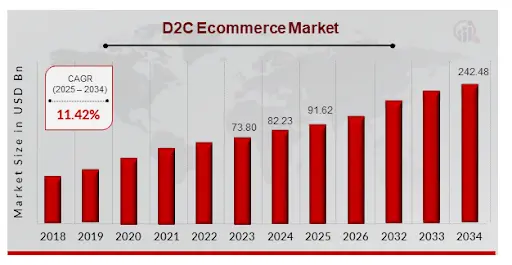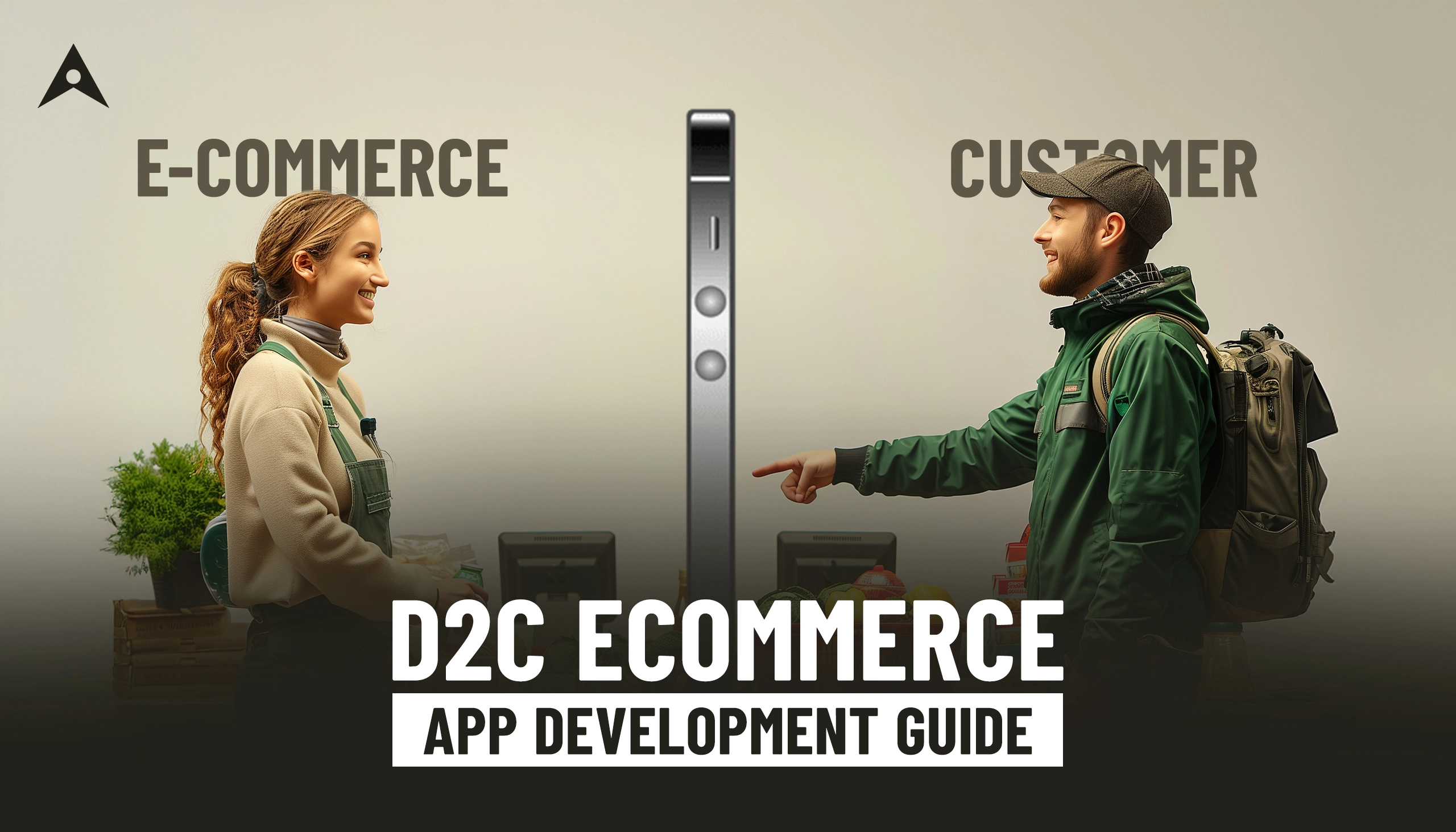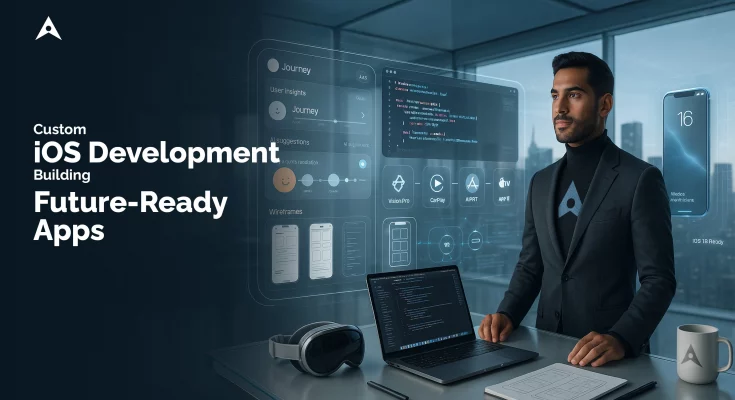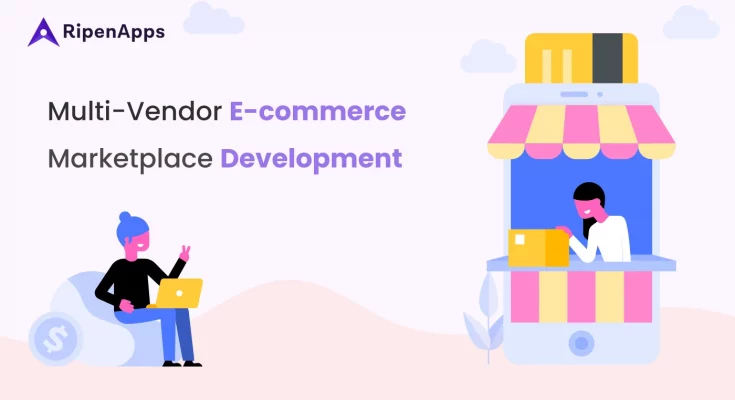In today’s digital-first economy, customers no longer want to rely on third-party platforms or intermediaries to shop for their favorite brands. Instead, they crave a direct and personalized connection with businesses—one that offers exclusive deals, a seamless shopping experience, and a brand journey they can relate to.
This is where Direct-to-Consumer (D2C) ecommerce apps have emerged as game-changers, which empower businesses to cut the middleman and build a direct relationship with their customers.
From boutique startups to established brands, businesses across industries are increasingly investing in D2C ecommerce app development to take full control over their sales, customer data, and brand experience. However, building a successful D2C app is not just about creating an online store. It requires strategic planning, robust technology, and user-centric design to stand out in the competitive ecommerce landscape.
In this detailed guide, we’ll take you through a step-by-step process for developing a D2C ecommerce app—from defining your business goals to launching a fully functional platform.
Whether you’re a business owner looking to launch your first ecommerce app or an entrepreneur aiming to enhance your existing D2C presence, this guide will equip you with the right knowledge, insights, and very helpful practical steps you need to create a scalable and profitable D2C app.
Table of Contents
What is a D2C Ecommerce App?
A D2C (Direct-to-Consumer) E-commerce app is a digital storefront and business method where companies can sell their products and services directly to consumers without relying on a third party like a retailer, marketplace, or intermediaries in the distribution chain. These apps usually provide in-app product catalogs, easy-to-navigate checkout systems, loyalty programs, and integrated customer support, all under one roof for both ordering and facilitating interaction between buyers and sellers.
In a staunch contrast to traditional retail methods where businesses mostly went through intermediaries like suppliers or Amazon/Flipkart platforms to reach their customers, D2C apps gave businesses complete control of the customer journey, starting from browsing through buying to post-sale patronage. Through D2C apps, businesses can charge competitive prices, thus keeping profit margins high.
A D2C Ecommerce app extends a more intimate, brand-oriented experience for the customers, generally with favorably priced offers, access to new product launches, special discounts, and bespoke offerings. Businesswise, it provides a channel to acquire customer data, insights into purchasing behavior, and marketing strategies, which in turn could refine their funnels to enhance customer retention in the long run.
Features of a D2C E-commerce App
- User-Friendly Interface and Navigation
- Personalized Product Recommendations
- Seamless Payment Gateway Integration
- Real-Time Order Tracking
- AI-Powered Chatbot for Customer Support
- Push Notifications and Alerts
- Wishlist and Save for Later Option
- Multiple Payment Methods
- Secure User Authentication and Data Privacy
- In-App Reviews and Ratings
- Loyalty Programs and Discounts
- Advanced Search and Filter Options
An Overview of the Current State of D2C Ecommerce Market
The D2C commerce world is blazing new trails in Earth-shattering shifts in consumer behavior preferences, digital transformation, and consequent mobile-first shopping experiences. If you pay attention to the current market data you will witness the growing dominance of the D2C segment in the ecommerce market.
According to the latest market reports, the global D2C ecommerce market is estimated to rise from $91.62 Billion in 2025 to $242.48 Billion by 2034 at a CAGR of 11.42% during 2025-2034. In the 2023 financial year, Nike Direct contributed 43.6% of Nike’s total revenue. It means over 43$ of every $100 generated from their direct-to-consumer (D2C) segment.

(Source: Market Research Future)
This is accorded favor, particularly by millennials and Gen Z buyers who are increasingly becoming inclined to all things D2C for having access to exclusive promotions, based on truth and authenticity, with a focus on personalized shopping experiences.
One of the primary factors behind the D2C market’s rapid expansion is technological innovation in ecommerce app development. Today, direct-to-consumer app development empowers businesses to build their own digital storefronts, eliminating the need for third-party platforms and enhancing brand-customer interactions. With mobile usage dominating ecommerce transactions, brands are prioritizing mobile-first D2C strategies to stay competitive.
As a matter of fact, the disruption running through the traditional retail world has seen the brands go digital-first through their branded apps in order not to see lost patronage. Hence, the very same shift ushered in the way for businesses to step into understanding the exact needs that the customers require, refine their marketing efforts, and hereby raise customer loyalty.
At any rate, these apps do bring a lot of customer satisfaction as well as address critical pains of the industry because this whole practice of eCommerce app development solves problems for the retail industry by incorporating efficient systems to streamline their operations, ensure customer retention and, most importantly, boost profit margins.
Therefore, ecommerce businesses nowadays look to work with, a D2C eCommerce app development company to build D2C ecommerce app solutions for better growth. Best eCommerce app developers in USA also report the increasing need for D2C ecommerce app development services in the market due to consumer demand for personalized customer experience.
Why Should Business Owners Develop a D2C Ecommerce App?

In this digital competitive world of today, business stakeholders are shying away from any reliance on third-party platforms for outreach to the customer. It is highly critical for businesses to have a dedicated D2C ecommerce app as a necessity to have more of a handle on the brand, more profits, and a closer relationship with core customers. Ecommerce businesses now look to develop D2C ecommece due to many benefits associated with this. Here are those
1. Stronger Brand Control and Ownership of the Customer Base
With the sale of goods by third-party marketplaces, customer data and third-party rules bind. A D2C ecommerce app allows the brand to hold the reins of its promotions and connect them to the consumer. This means the brand is now able to gather more findings, interpret, prospect, and use first-party data.
While the brand can now personalize the shopping experience, this data helps in delivering a more interaction-focused approach toward customer relationship management. It means brands are no longer bound by the commission fees and policies of external platforms, making their operations more profitable and sustainable.
2. Higher Profit Margins and Direct Sales
The D2C app enables cutting out operational costs and thus allows the full profit to be transferred to the seller. Thereby any level of competition from the outlet on prices, discounts, or promotions directly goes to the seller or brand. Now, it does not organize the pricing with respect to a third-party platform.
Apart from this, in-app upselling and cross-selling features enable businesses to maximize their revenue potential. The highlight is how D2C ecommerce apps could substantially work for a brand if so much more value could be offered than that with their bottom line.
3. Future-Ready With AI-Powered Personalization
The D2C market is now much faster for D2C brands to look forward to their future with AI-powered mobile apps redesigning ecommerce itself. With AI and machine learning algorithms, product recommendations can be rendered in real time, planning ahead with predictive analytics. It is a promise for chatbots to perform automated customer care.
The ability of AI to gain a huge analytical advantage also helps in all ways possible. It ultimately enhances attrition and increases overall efficiency through things such as smart inventory management and predictive forecasting. If you’re still wondering how to boost your ecommerce business with AI-powered mobile apps, investing in a D2C platform with AI capabilities is the answer.
4. Getting a Competitive Edge in a Crowded Market
These days, developing a D2C app would be a HUGE differentiator. While your app is becoming branded, filled with features unique to your business, and mostly somewhat unsurpassed in your customers’ experience will help brand companies become identified distinctly.
But here, you have to find a top-rated mobile app development company that will help in ensuring the development of an app that is highly scalable, performs extremely well, and delivers an unparalleled UI experience.
Further, those businesses based out of Dubai will tap into world-class knowledge and innovative cyber practices by collaborating with a mobile app development company in Dubai to stay competitive and future-ready with an app.
5. Improved Scalability and Business Expansion
Investing in D2C app development means laying the foundation for scalability in the long run. With a solid backend infrastructure, businesses will be able to scale up and manage growing demands, extend their products, and tap into new markets, which those businesses that depend on third parties can be restrained from achieving.
Moreover, businesses will have advanced features that allow for a better user experience like AR/VR product demos, voice search functionalities, and multilanguage optionality, all improving the app’s reach.
6. 24/7 Availability and Better Customer Service
D2C e-commerce apps provide around-the-clock access to products and services for customers. By implementing live chat support, chatbots, and real-time assistance, businesses work with chatbot development company to ensure top-notch customer service by resolving issues swiftly for maximum customer satisfaction. In addition to this, push notifications and personalized alerts keep users engaged and generate more frequent interactions and purchases.
Step-by-Step Process of D2C Ecommerce App Development
Building a D2C ecommerce app is a complex yet highly rewarding endeavor that requires a strategic approach, technical expertise, and meticulous execution. From initial planning to post-launch optimization, each step is crucial for delivering a robust, user-friendly, and scalable application.
Being a leading mobile app development company we know what it takes to build a fully functional direct-to-consumer app. Here we have shared the detailed breakdown of the D2C ecommerce app development process:
1. In-Depth Market Research and Requirement Analysis
Before you delve into the development, you have to first understand your business and technical needs. It is because the foundation of any successful D2C ecommerce platform development lies in thorough market research, which involves:
- Understanding the target clientele: Identifying customer preferences, shopping behaviors, and pain points.
- Competitor analysis: Comparative analysis of other existing D2C apps that allows understanding of the strengths and weaknesses thereof.
- Defining app goals and objectives: Whether you want to increase customer retention, expand market reach, or boost direct sales, outlining clear goals helps shape the app’s features.
- Prioritizations: At this point, due diligence shall be done to investigate the prime core features considered important in personal recommendations, easy checkout process, and loyalty programs.
From this initial stage, it is ideal for an established ecommerce app development company to be brought along the way so that quite accurate market insights are featured for the company’s foundation.
2. The Right Development Approach Must Be Selected
The next phase follows once the goals are already set. Generally, there are two approaches in mobile app development one is native and the second is cross-platform. However, most businesses favor going with a cross platform app development company for this approach to get access to a larger customer base while reducing costs and time-to-market.
By building one app codebase for both Apple and Android OSs, apps get to operate in a consistent manner on design and performance. This is the main reason why e-commerce businesses should choose cross-platform app development, it’s because this approach provides scalability, cost-effectiveness, and broader market reach.
3. Wireframe and UI/UX Design
Wireframing comes after that. Wireframing is about bringing the app blueprint alive. The process outlines the initial app layout, structure, and flow of navigation. After the wireframing gets sanctioned, the actual UI/UX design process starts.
Here, you have to note that if your app has complex technical requirements you might have to consult or collaborate with a custom application development company. This step will make sure visual perfection for the D2C ecommerce app to keep users satisfied and engaged.
4. Frontend and Backend Development
Once the two final figures of wireframe and design are approved, the app development starts with frontend and backend coding. Frontend development involves building the user-facing side of the app, including product displays, navigation, checkout pages, and more.
The backend is the engine that powers the app, managing data processing, authentication, and server-side functions. It involves integrating APIs, databases, and payment gateways. Whether you hire D2C app developers or outsource your project to a top D2C app development company you must check your development partner holds proven expertise in building applications for the D2C domain.
5. Conduct Rigorous Testing and Quality Assurance
Before landing in the hands of users, the D2C app needs to be thoroughly tested to ensure there won’t be operational holes before going live in the world. Most importantly, problems like bugs or vulnerabilities detected have to be smashed immediately.
An online store with functioning shopping carts and an AI chatbot needs encryption, as payment information and customer behavior data may potentially breach someone’s privacy. Therefore, it is critical to conduct rigorous testing and quality assurance.
6. Deployment and App Store Launch To Go Live
Once the app passes the quality assurance phase, it’s time for deployment. This is when your D2C app makes its official journey on the Apple App Store and Google Play Store for your customers to use.
It is a better idea to release a beta version/release before the official launch occurs so that a small lot of users can look through it and provide changes and feedback on things you could improve. Some noticeably popular and fun beta versions can grow a strong brand name penetration with visibility, increased customer engagement, and direct accessibility.
How much does D2C Ecommerce App Development cost?
The cost of D2C ecommerce app development is quite dynamic based on the features offered, platform compatibility, design, integration, etc. The basic D2C app with standard functionalities like product listing, cart, and checkout should cost anywhere in the range of $25,000-$50,000.
However, the price for a custom-built app, however, could easily surpass the $100,000 limit due to the integration of advanced capabilities, AI-powered suggestions, and cross-platform compatibility.
Hence, to get an accurate D2C app development pricing estimate, it’s best to consult with D2C eCommerce app development company in USA that can assess the specifics of your distinct project if you are based in this country.
Examples of Some Famous D2C E-commerce Apps to Learn From
The growing popularity of D2C ecommerce has paved the way for many brands to cut out middlemen, establish direct connections with customers, and scale profitably. Several brands have successfully leveraged D2C eCommerce app development to transform their business models, offering valuable insights for aspiring entrepreneurs. Here are some prominent examples:
1. Glossier – Leveraging Community and Personalization
Glossier, a brand launched out of a cosmetics blog, is successfully established in the global D2C space. The sponsoring app is community-driven, allowing users to generate comments and share images and experiences.
Glossier has continued to hold customers in thrall by personalizing product suggestions based on customer preferences. Their ability to triumph has thus provided ample proof of how customer-driven mobile app experiences pave the way for stellar growth in the D2C market.
2. Allbirds – Eco-Friendly D2C Footwear
With eco-friendly shoes, Allbirds used its sustainable production model to make the whole cut toward D2C e-commerce. Showcasing product availability in real-time, easy checkout options, and descriptive product details give the customers a clear insight into their environmental practices. Allbirds’ app is a veritable nourishment for the soul on how sustainability-based branding and sleek app designs can induce loyalty among your customers.
3. Warby Parker – Revolutionizing Eyewear with a D2C Model
Warby Parker perhaps epitomizes D2C brilliance in the eyewear realm. By providing stylish and cheaper glasses directly to consumers, they turned the traditional optical retail model on its head. The augmented reality app allows users to take virtual stabs at fitting various frames on their faces before purchasing.
Warby’s brilliant use of AR/VR tech greatly enhanced customer engagement and positively impacted their conversion rates; harness the power of VR to boost conversion rates on your e-commerce app!
4. Casper – Direct-to-Consumer Sleep Goods
Casper, the burgeoning sleep and mattress brand, bypassed retailers and went straight to the customers. Their D2C app allows potential purchasers to interactively experience buying with various tools such as product comparison troubleshooting, customer review sections, and easy financing options. By simplifying the mattress buying process through their app, Casper went on to show how old-fashioned industries can also reach the first goal through the route of D2C ecommerce.
Conclusion
Ultimately, the brands that thrive in the D2C space will be the ones that prioritize customer-centric design, embrace emerging technologies, and continuously evolve their apps to meet changing market demands. With direct access to customers, brands can foster stronger relationships, offer personalized experiences, and drive higher profit margins by cutting out intermediaries.
However, creating a successful D2C app goes beyond simply having an online store., business owners need to work with an expert ecommerce app development company like RipenApps to confidently build a result-driven D2C app and gain a competitive advantage.











 India
India USA
USA Australia
Australia Canada
Canada UK
UK UAE
UAE
